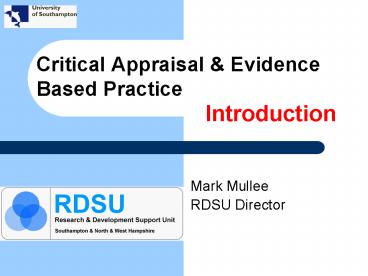Critical Appraisal - PowerPoint PPT Presentation
1 / 20
Title:
Critical Appraisal
Description:
09.30 10.15 Critical Appraisal Skills for Quantitative Research- Mark Mullee ... of effectiveness (e.g. Cochrane Database of systematic reviews, Bandolier) ... – PowerPoint PPT presentation
Number of Views:317
Avg rating:3.0/5.0
Title: Critical Appraisal
1
Critical Appraisal Evidence Based Practice
Introduction
- Mark Mullee
- RDSU Director
2
Critical Appraisal Morning Programme
- 09.0009.30 Introduction to Critical Appraisal
- Helen Elsey
- 09.3010.15 Critical Appraisal Skills for
Quantitative Research- Mark Mullee - 10.1510.45 Workshop Critical Appraisal of a
Published Paper Mark Mullee - 10.4511.00 Tea/Coffee Break
- 11.0011.30 Feedback and Discussion
- Mark Mullee
- 11.3012.15 Critical Appraisal Skills for
Qualitative Research Helen Elsey - 12.1512.40 Workshop Critical Appraisal of a
Published Paper Helen Elsey - 12.4013.00 Feedback and Discussion
- Helen Elsey
3
Learning outcomes
- Learning outcomes by the end of the day
participants will be expected to - To understand how critical appraisal can inform
evidence based practice - To be able to use critical appraisal tools for
both quantitative and qualitative research
studies.
4
Plan of the day
- Introduction
- Critical appraisal skills for quantitative
research. - Workshop quantitative study
- Feedback and discussion
- Lunch
- Critical appraisal skills for qualitative
articles - Workshop qualitative study
- Feedback and discussion
- Final summary
5
Why do we read papers?
- Literature search- research proposal/study
- Evidence based practice
- Personal development/ interest
6
What is Critical Appraisal?
- Process of systematically examining research
evidence to assess its validity, results and
relevance before using it to inform a decision - Essential part of evidence-based practice.
- Enable us to draw conclusions from and act on the
evidence presented.
7
Critical appraisal attempts to
- Identify the strengths and weaknesses of studies.
- 1. The internal validity of the information. I.e.
how the information was collected and/or
summarised. - 2. The external validity of the information. I.e.
how relevant information is to any specific
question posed by the reader.
8
Pros of critical appraisal
- A systematic way of assessing the validity,
results and usefulness of papers. - One step in the process of evidence-based
practice, along with finding the evidence and
changing practice. - Encourages objective assessment of the usefulness
of information. - Common sense approach, user friendly tools are
available
9
Cons of critical appraisal
- Time-consuming initially, although with time it
becomes automatic. - Does not always provide the reader with the
easy answer or the answer one might have hoped
for it may highlight that a favoured
intervention is in fact ineffective. - It highlights a lack of good evidence.
10
CASP
- CASP (Critical Appraisal Skills Programme)
- aims to enable individuals to develop the skills
to find and make sense of research evidence - http//www.phru.nhs.uk/casp/casp.htm
11
CASP
12
Critical Appraisal
- Part of a continuum
Critical Appraisal Skills Programme (CASP)
- Asking an answerable question
- Searching for the best evidence
- Critically-appraising the evidence
- Acting upon the evidence
13
Literature search question
- Answerable
- In three parts
- Population / patients
- Intervention / treatments / tests
- Outcomes
14
Literature searching
- Using electronic sources
- National Electronic Library for Health
- Summarised evidence of effectiveness (e.g.
Cochrane Database of systematic reviews,
Bandolier) - Individual studies using databases through
Dialogue (e.g. Medline, Embase, CINAHL) - Current issues of journals
15
Information required within seconds
- Systematic reviews, periodically updated, of
randomised trials of the effects of health care
(from all sources, and in all languages)
16
Information required within seconds
- Evidence-based journals of 2º publication
- screen 50-70 clinical journals per week for
clinical articles that pass critical appraisal
quality filters è conclusions likely to be true - selects subsets that are clinically relevant
- summarised as more-informative abstracts
- added commentaries from clinical experts
- introduced with declarative titles
17
(No Transcript)
18
(No Transcript)
19
CASP Learning Resources
20
CASP Critical Appraisal Tools

